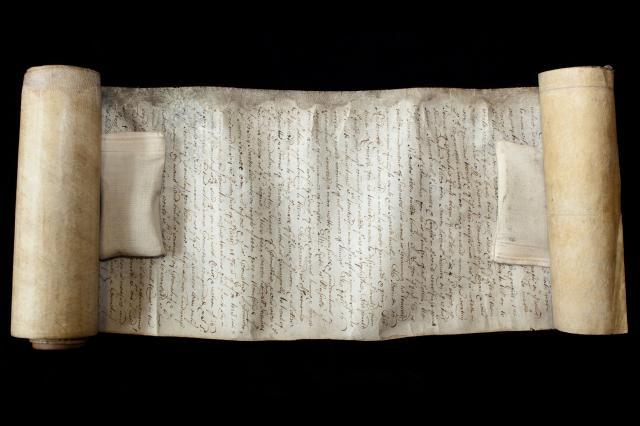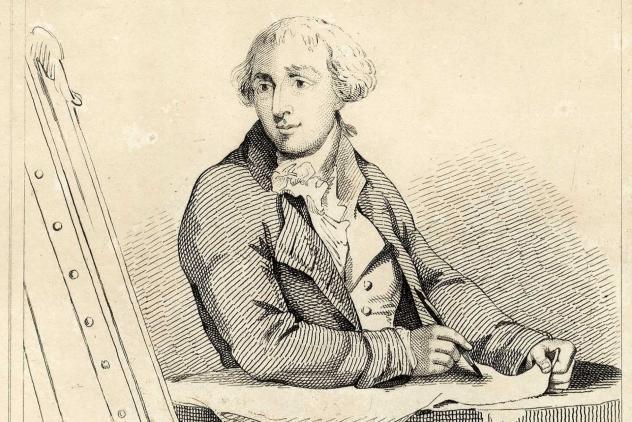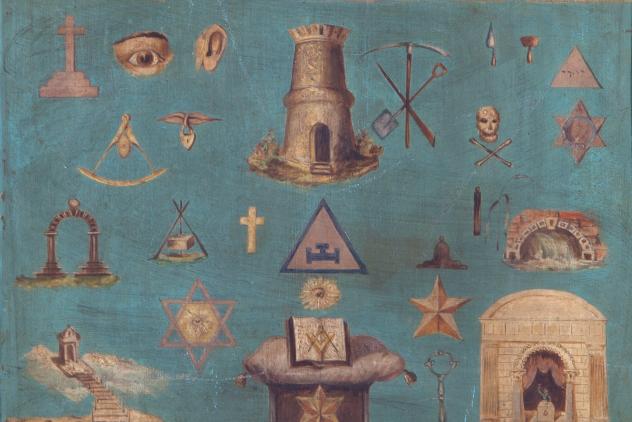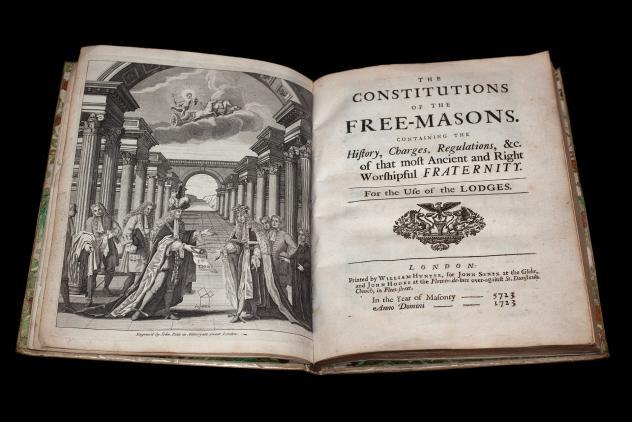There can be quite a lot of factors to consider when looking after your records. With some materials being more delicate than others, it is important you know how to protect and conserve them. Our experts have some advice to help you.
Why is it important to look after Lodge and Chapter records?
Lodge and Chapter records provide a permanent record of proceedings at meetings and include information about former members. They help to form the corporate memory of the organisation. Sadly, if this information disappears answers to questions such as why, who, when, where and how may be lost forever. Lodges or Chapters unable to prove continuity of meetings may be unable to claim centenary warrants or charters. Over time these records also provide unique information about local communities and may be of interest to those researching local history.
Although rules on preparing Lodge and Chapter minute books is included in the Book of Constitutions (Rule no. 144 states that all Lodges are required to keep a minute book. Similar rules cover Chapter and Lodge of Instruction records), this guidance now provides specific advice on how to care for all Masonic records.
Why are Lodge and Chapter records at risk?
Secretaries or Scribe E’s are the officers responsible for looking after the records of a Lodge or Chapter. If the meeting place of the Lodge or Chapter cannot offer space, storage of records in domestic situations can lead to damage and loss. Banks or other commercial storage facilities charge for storage, which may be unsuitable for paper-based records because of variable temperatures, or at risk from damp or water damage.
Loss or damage to Lodge or Chapter records is usually preventable. It is important for Lodges and Chapters to maintain and regularly check an inventory of their records.
What records should be kept?
- Minute books
- Signature books/Attendance registers
- Declaration books
- Membership registers/Record books
- Lodge/Chapter committee minute books and associated records
- Account books
- Clearance certificate counterfoils
- Correspondence files
- Annual returns
- Collections of summons
- Photographs and photograph albums
- Lodge of Instruction: minute books, membership registers, account books
- Petty cash records, comprising cheque stubs, invoices, etc should be destroyed securely after seven years. Retain a copy of all year-end Annual Reports and Statement of Accounts.
Can anyone help look after Lodge and Chapter records?
Museum of Freemasonry cares for the records of erased Lodges and Chapters on behalf of the Grand Master but has no space to care for the records of active ones. Some Provinces provide storage for records or have sought other solutions.
The Museum offers an off-site storage solution in compliance with environmental archive storage standards for London lodges seeking a solution to storage problems. For further details and charges please contact the archive team at the museum.
Compliance with recommended standards for archive storage is difficult to achieve. One solution may be to deposit records with local record offices, many of which can offer BS 4971: 2017 compliant storage for records. In return for possible contributions towards re-boxing and conserving records, record offices will catalogue items and make them available for public research. They are subject to agreed minimum closure periods to protect the Data Protection rights of members. Records may be withdrawn on loan and can be consulted by Lodge or Chapter members in the repository’s search room.
Wherever possible, avoid depositing records covered by restricted access periods. If Lodge/Chapter representatives wish to view restricted access, deposited records, then record offices cannot differentiate against access by other users under information legislation. Alternatively, Lodges/Chapters could withdraw restricted access records on a temporary basis rather than inspecting them in record office search rooms in accordance with record office regulations.
Depositing such records represents a valuable contribution by freemasons in providing additional resources for local history. Busy Secretaries and Scribe E’s can then refer requests for genealogical information about former members to local record offices.
Lodges and Chapters considering depositing records directly with local record offices should liaise initially with their Provincial or Metropolitan Grand Lodge before contacting the Museum. The Archive team can provide advice for Lodges and Chapters on identifying, contacting and negotiating deposits with record offices.
How should Lodges and Chapters record minutes and other records?
Few Lodges and Chapters now maintain handwritten minutes but many continue to use bound minute books, which remain in use for many years. Word-processed minutes, together with summonses, copies of accounts and reports, are attached to pages. As a result, book blocks distort and separate from covers, overfull volumes are difficult to store and transport and they become vulnerable to damage. Self-adhesive tape, pins or glue used to attach sheets can damage pages or disintegrate over time, resulting in the loss of loose sheets.
Documents created by laser printers are more robust than those created by jet printers, whose inks may not be stable. Try the following test – if ink smears when a damp (not wet) cloth is run over a sample test page it is unstable and therefore not permanent.
Two recommendations for the maintenance of good minutes:
1. Slim line skeleton minute books into which minutes printed on permanent paper can be glued (Permanent paper ISO 9706:2000: often identified by an infinity mark symbol within a circle. Conqueror laid-paper and ranges such as Texture and Concept achieve this standard – a ream costs under c.£30. R K Burt & Co Ltd supply superior quality archive text paper).
2. Minutes printed on permanent paper can be kept securely in a 4-post lockable binder and then bound into volumes. (Shaw & Sons Ltd supply re-useable binders; they also offer over-cast binding of volumes , with blue or red cloth covers and gold lettering of name of Lodge/Chapter on cover and spine provided as optional extras).
In addition:
- Only glue such as Pritt stick or an inert cold-water, starch-based paste should be used for pasting loose sheets into minute books (powder to which water is added, available from Conservation Resources).
- Self-adhesive tapes, such as Sellotape, or other solvent-based adhesives should not be used.
- Brass paperclips not metal pins should be used (available from Conservation Resources as above).
- Each page of loose-leaf minutes should be initialed by the Master/Z and Secretary/Scribe E.
Why does paper disintegrate?
Early Masonic certificates and some volumes are made of parchment. This is robust and will withstand considerable bad treatment. However most Lodge and Chapter records are made from card and paper, the quality of which can vary significantly.
In Britain, paper began to replace parchment as the preferred medium for documentation just as freemasonry began to emerge in the late seventeenth century. Usually expensive and of good quality, paper was made initially from cellulose fibres derived from rags. As record keeping and levels of official bureaucracy and literacy expanded in the nineteenth century, the demand for cheaper paper escalated. Poor quality wood pulp papers, which contain lignin that converts to lignic acid, replaced their more expensive, rag counterparts.
Bulking materials were often added to wood pulp and the mix treated with various chemical catalysts to accelerate fibre disintegration. Bleaching agents were added to improve appearance. Therefore paper fibres include high acid concentrations, which accelerate self-destruction over time. Poor-quality paper, such as newsprint, ages to yellow or brown tones and pages split and disintegrate.
Various preservation methods prevent further deterioration. Damage can never be reversed entirely but specialist paper conservators can repair many documents. However, prevention is always better than cure.
How can we prevent damage to records?
Damage occurs when paper is stored in unsuitable conditions. Temperature fluctuations and exposure to heat, damp and pollution can accelerate its self-destruction and raise the risk of mould and pest damage.
Wherever possible, records should be stored in clean, dry (but not too hot) areas away from direct sunlight. Fire prevention measures should be considered and filters attached to air vents can eliminate harmful pollutants. The British Standard for storing archives recommends a stable relative humidity between 45-60%, with an average mean temperature between 16-19°C, but achieving these levels often requires specially designed storage facilities (BS 4971:2017 Recommendations for the storage and exhibition of archival documents).
How can we protect records from further damage?
If providing a stable storage environment is achievable, placing volumes and papers in acid-free boxes can enhance the long-term preservation of records. Loose papers can be placed in acid-free folders within boxes, and items such as photographs and certificates placed in inert polyester sleeves (See list of suppliers and additional information. Contact the Archivist at the Museum of Freemasonry for further advice).
Volumes too large for boxes should be stored flat on shelves, wrapped in acid-free paper. Metal, roll-edge shelving provides the best storage for boxes; do not stack more than two or three high. Documents damaged by surface dirt or smoke can be cleaned with care using smoke sponges or soft brushes. Always wear a mask when brushing mould spores and insects from documents. Replace metal paperclips and pins with brass paper clips that do not rust. Remove rubber bands and polythene pocket wallets. Handle fragile items with care – use thin cotton (not latex) gloves and wash hands regularly, especially when looking at photographs.
Advice is available from:
- British Records Association The Care of Records, Notes for the Owner or Custodian
- The British Library Leaflets on various aspects of preservation, photocopying guidance, handling and cleaning documents, dealing with photographs, etc and useful guidance on preventing and coping with disasters.
- The Conservation Register Useful guidance on how to find and contact accredited paper conservators and how to select and undertake conservation work on documents and volumes.
How can digitisation help?
Some Lodges and Chapters have decided to digitise records – this helps to preserve fragile, original records. Digitisation can offer searchable access to records if bespoke software technology is applied to index images. Digitising records before conservation or depositing them with local record offices ensures continued access for members to information. Do not destroy the original records – use digital versions as surrogate copies.
Storing images and documents, such as Lodge or Chapter minutes, on CD ROMs and other electronic storage devices, creates unexpected problems. Information and images recorded in digital formats must be managed actively, not passively, to ensure they remain accessible over time. New versions of software (such as Excel, Word etc) and hardware (a disc, laptops, hard drives etc) may cause documents created in older formats to become unreadable or obsolete.
Digitised data must be stored on discs of good quality and migrated every five years to avoid damage such as digi-loss. Update or migrate records written in older software programmes to the latest version on a regular basis to ensure they can still be read. Preservation guidance also suggests copying data in alternative formats as a back-up for digital storage. Ensure passwords to PCs storing digital copies are retained by the Secretary/Scribe E to avoid incidental loss of access (Contact the Archives team for additional advice on selecting a bureau to copy your records, image file formats and types, image resolution, metadata, copyright, preservation, quality control and costs. Practical guidance on keeping electronic records and digital images is available at savemymemories.org and the leaflet, Caring for CDs and DVDs from the National Preservation Office).
Recommended suppliers
The Museum of Freemasonry is available to supply limited quantities of acid-free archive boxes, which usually contain 3-4 smaller minute books, at a cost of £15 each. We can also suggest the following suppliers:




